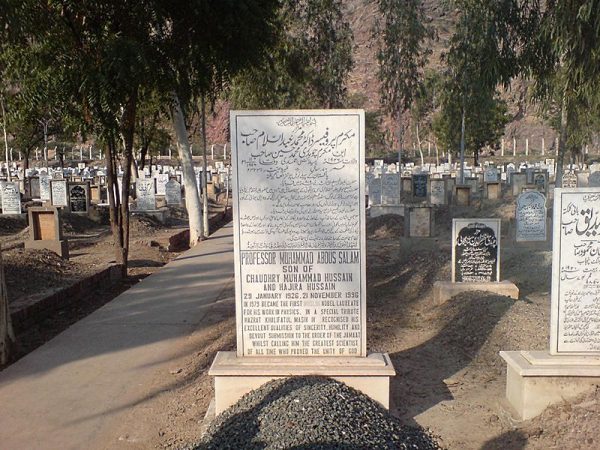
Pakistan is indubitably more phobic of the Ahmadiyya sect, and their interpretation of Islam, than most of the states that Khan vocally deems “Islamophobic.”
The grave of Dr. Abdus Salam (1926-1996) in Rabwah. In the English inscription, the world “Muslim” has been erased from the phrase “the first Muslim Nobel laureate.”
On Sunday, the Punjab Police desecrated 45 graves belonging to the Ahmadiyya Muslim sect in Pakistan’s Hafizabad town. Police personnel damaged the tombstones and removed Islamic inscriptions in accordance with the law. The Pakistani Constitution officially declares the Ahmadiyya sect of Islam to be “infidels” and bars members of the community from “posing as Muslims,” which the vandalized graves were found guilty of.
In addition to desecration of graves, the police also regularly demolish Ahmadi mosques over similar allegations against them masquerading as Muslim worship places. Ahmadis are barred from giving the Islamic call to prayer, or even displaying “Muslim names” in front of their homes.
Most ominously, the Ahmadiyya sect remains the most vulnerable to Pakistan’s violent blasphemy laws, with at least 13 Ahmadis killed and 40 wounded since 2017 owing to their identity. This is in addition to the jihadist attacks on the community. In 2010, twin mosque terror raids in Lahore killed at least 94 Ahmadis.
The persecution of Ahmadis is rooted in the sect’s faith in its 19th century founder Mirza Ghulam Ahmad, which representatives of other Islamic sects deem sacrilegious. They allege that belief in Ahmad contradicts Muhammad’s status as the final prophet of Islam, which Ahmadis insist is misrepresentation of their faith. Even so, theological deliberations should be irrelevant to the right to profess any version of any religion, as enshrined in Pakistan’s Constitution and the United Nations Declaration of Human Rights that the country is signatory to.
Diplomat Brief Weekly Newsletter N Get briefed on the story of the week, and developing stories to watch across the Asia-Pacific. Get the Newsletter
On the contrary, Ahmadiyya beliefs are dragged into astonishingly unrelated realms in Pakistan. In 2018, the incumbent Imran Khan government backtracked on the appointment of renowned economist Atif Mian as financial advisor owing to his Ahmadiyya faith. The Islamist rationale: those who are loyal to the Ahmadiyya beliefs cannot be loyal to Pakistan.
Enjoying this article? Click here to subscribe for full access. Just $5 a month.
Not only are Ahmadis accused of being collaborators with “India and Israel,” the Ahmadiyya sect can be held responsible for pretty much any predicament, including the outbreak of COVID-19. Pakistanis have to denounce the Ahmadiyya faith if they want voting rights, a passport, or even the Islamic marriage certificate.
The widespread anti-Ahmadiyya bigotry, self-manifesting for decades via messages in popular markets such as “Ahmadis and dogs not allowed” or “Ahmadis should enter Islam before entering this shop,” has now gone digital with online deliveries being refused to members of the community.
What Pakistan unquestionably has in place is veritable religious apartheid. This apartheid is overseen by Imran Khan, who is working tirelessly to unite the world against Islamophobia. Not only is Khan seemingly oblivious to the terror that religious minorities in his own country are facing, he quite clearly doesn’t realize that he’s fighting against Islamophobia while leading a country where one can be arrested for practising Islam.
Indeed, Pakistan is indubitably more phobic of the Ahmadiyya sect, and their interpretation of Islam, than most of the states that Khan vocally deems “Islamophobic.” In Pakistan, Ahmadis have been arrested for purchasing literature, partaking in Eid celebrations, or even reciting the Quran.
The government’s Islamic advisory body has even incited genocide against Ahmadis. Ministers have called for “beheading of blasphemers,” which, incidentally, is the law in the country, used by Islamist mobs to get away with murder.
Groups dedicated to upholding apartheid against Ahmadis, like the Aalmi Majlis Tahaffuz Khatm-e-Nabuwwat, hold massive rallies, with their narrative supported by the political leadership, including prime ministers past and present. The Pakistan-based anti-Ahmadi groups have now taken their anti-Ahmadi violence to the West, including the U.K., with the Muslim Council of Britain repeatedly excommunicating British Ahmadi Muslims.
Ignoring the grotesque marginalization faced by non-Muslims in many Muslim-majority countries dents the fight against anti-Muslim bigotry in the West. Realities such as Ahmadiyya persecution in Pakistan underline that even Muslims with divergent or dissenting beliefs are largely sidelined by the campaigners against Islamophobia.
For Pakistan, ignoring the apartheid against Ahmadis has resulted in similar calls against Shia Islam being echoed in, among other places, the parliament. It has further emboldened a three-way turf war among Sunni jihadist groups, which root their Islamic terrorism in takfir, the belief that they have the right to determine who is and isn’t a Muslim.
Nothing embodies the perils of takfir more so than the tombstone of Pakistan’s – and the Muslim world’s – first Nobel Prize winner Dr Abdus Salam. Desecrated, just like the graves in Hafizabad, it now reads: “Professor Muhammad Abdus Salam, in 1979 became the first ****** Nobel Laureate for his work in Physics.”







